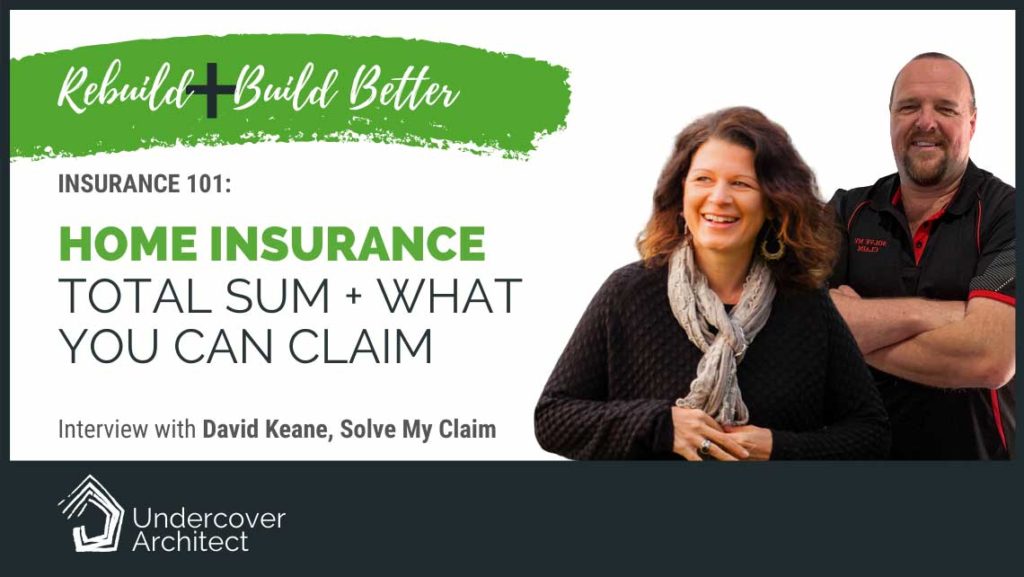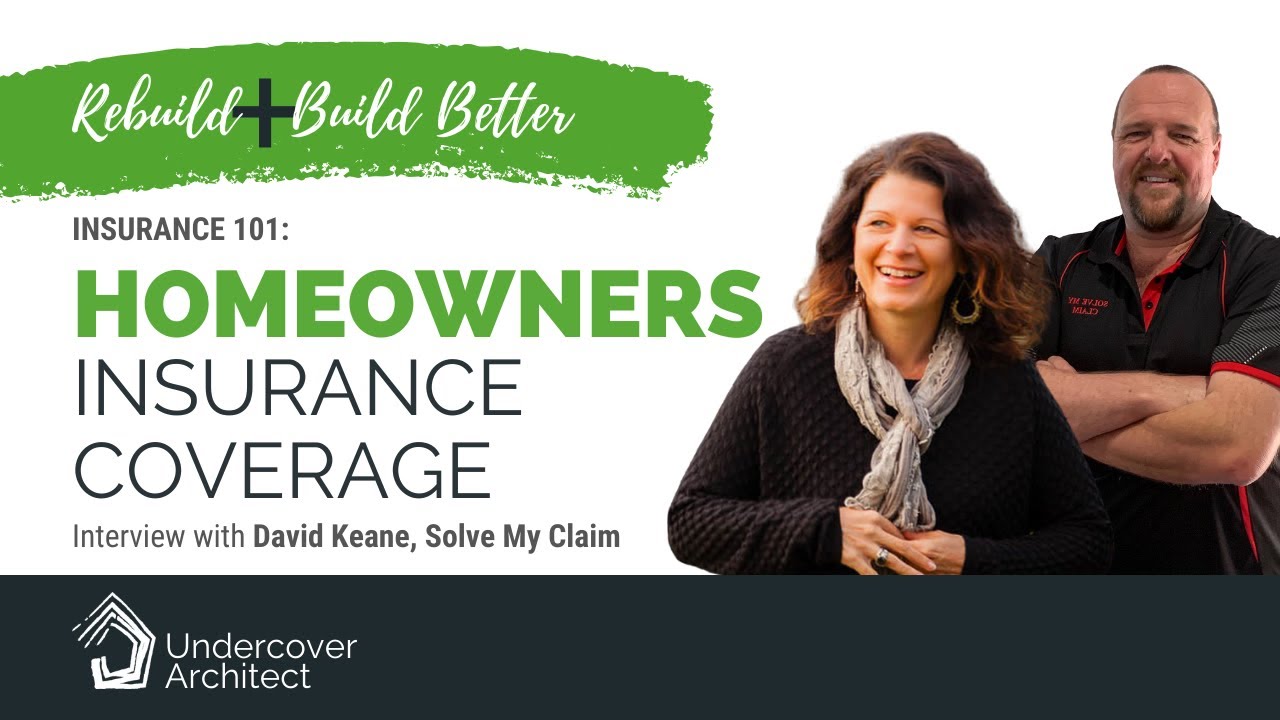
If you lose your home in a bushfire or similar scenario, will you simply get the total sum insured? That may not be the case.
Just because you’re insured for a total sum does not necessarily mean that’s what you’ll get paid if you lose your home.
As a homeowner with home insurance, it can be reasonable to think that, if you’ve chosen a total sum insured for your property and you’ve been paying premiums on that total sum insured, that that would be the amount that you’re entitled to should you lose your home in something like a bushfire or a similar event.
However, as you’ll see in this video, you can be mistaken (scroll down for full transcript of this video).
In this interview, I speak with David Keane from Solve My Claim.
David Keane has been in the insurance industry for over 24 years now, and he created Solve My Claim to help and assist homeowners navigate their insurance claims and disputes.
In the last three years alone, Solve My Claim has helped homeowners secure more than $35 million in additional insurance claim settlements.
So let’s dive in.
INTERVIEW TRANSCRIPT
Amelia Lee + David Keane (Solve My Claim)
[Amelia Lee] Well David, it’s awesome to have you here. I know that you’re going to be sharing a wealth of information with everyone, because you have a huge experience and knowledge base when it comes to this topic and helping homeowners deal with, I suppose their insurance, and just general information around how do we navigate the world of insurance so that we’re fully protected and managing our risk.
Now, looking through a lot of your information online, I’m going to put resources for Solve My Claim in all of the links as well so that everybody can find you. You talk a lot about
[David Keane] Sure, thank you.
[Amelia Lee] The fact that people, when they’ve experienced total loss, they might just assume that they will just get the total sum that they’ve insured for, but that’s not always the case.
And I know with the thousands of homes that were lost in Australia’s bushfires over the 2019, 2020 period, there’d be some that would be thinking, “Well, it’s okay, I could just get then “the full amount that I’ve got.”
Can you talk through why that assumption is not necessarily correct and some of the different definitions that happen around this whole kind of total sum insured versus the reasonable cost to rebuild.
[David Keane] Sure, okay.
So, I guess the first thing is most policies have a fairly similar wording around this area, and that is that in the case of a loss, so it’s not just a total loss, but any loss, that the insurance company will at their option repair, replace or give you the cash amount that it would cost them to repair or replace the damaged item.
Now, that goes for whether it’s a, just a damaged part of the home or if the entire home is damaged.
And so, what that means is, if hypothetically the insurance company says that they build or can rebuild your home for say $400,000, and you got a $600,000 sum insured, you not automatically entitled to the $600,000, just because your house has been written off.
You’re entitled to by the terms of the policy, what it would cost the insurance company to replace the house.
Now, in principle, I have no problem with that, but the issue becomes that many times when builders will quote, will provide a quote, and then use that as a basis for the settlement … we all know that that quote is going to come, to bring with it variations, and all sorts of changes throughout the repair process. So that $400,000 is very unlikely to be the final figure.
And yet if your house is a total loss, you can’t go through that repair process and do those variations as you go, because the house has been valued at that. So, you’re actually only then entitled in principle to what it costs them.
On the other hand of that too, on the other side of that is if it costs them more than your sum insured to rebuild the home, you won’t necessarily get the additional, because there are limits on the policy, and there are a number of reasons which we might talk about a little bit later, as to why it might be more than your sum insured.
But I think many people just assume that, “Okay, I have insured for $600,000 “the house is destroyed, I’m going to get $600,000.” And that’s actually not, in many cases the way it’s going to work out.
[Amelia Lee] I can already feel frustration rising in me, because I think of our home, you know, that we wereprepping for evacuation in November. And my husband and I were saying, “Okay, yep, what’s the place insured for? All right, yeah, it’s enough … if this place went up in flames and we lost everything, that would be enough for us to replace what we have here.”
But we wouldn’t rebuild what we have. We would build something different!
So, and it’s that thing of where’s the line of the insurance company getting to have a say in … you’ve been paying premiums all this time based on that amount.
[David Keane] And it becomes very unfair in my view, is that the insurance company put all the onus onto you.
So the onus to get the sum insured right, rides on you, so if you over insured, you’re not entitled to any refund.
If you are underinsured, well that’s bad luck, that’s you didn’t show for enough. And so I think that the real unfair aspect to the whole contract in my opinion, is the, let’s call them the educated party, the knowledgeable party, yeah know, the insurance company, they have expertise at their fingertips, and it would be a lot easier for them to understand and to establish what your home is worth.
But they put it all onto the uneducated or the unknowledgeable party to the contract, the homeowner who really probably has no idea what the home’s worth, and they say, well, it’s up to you to get it right, if you get it wrong, well, you bear the consequence.
And so that’s what makes it so unfair. If it was a matter of, okay, we’ve all established that you’ve over insured, so let’s give you a refund and premium for the last five years, but that’s not gonna happen.
Or alternatively if it’s underinsured, and some policies will have, they’ll have additional benefits where maybe, there’s a 10% or 20% increase on the sum insured in certain cases, so that there’s to an extent, there’s a limited amount of, I guests coverage or, you know, like a buffer that’s built into some policies, but there are the exception rather than the rule.
THIS HAS BEEN PART 1 OF MY INTERVIEW WITH DAVID KEANE.
This interview is part of our Rebuild + Build Better series.
Be sure to stay tuned as we share more information and expertise in helping you rebuild after bushfires, or build homes more resilient to climate conditions and in bushfire prone areas.
Resources mentioned in this video:
Get in touch with David Keane, Solve My Claim, here >>> https://solvemyclaim.com.au/
Or check them out on Facebook here >>> https://www.facebook.com/solvemyclaim

 With over 30 years industry experience, Amelia Lee founded Undercover Architect in 2014 as an award-winning online resource to help and teach you how to get it right when designing, building or renovating your home. You are the key to unlocking what’s possible for your home. Undercover Architect is your secret ally
With over 30 years industry experience, Amelia Lee founded Undercover Architect in 2014 as an award-winning online resource to help and teach you how to get it right when designing, building or renovating your home. You are the key to unlocking what’s possible for your home. Undercover Architect is your secret ally
Leave a Reply